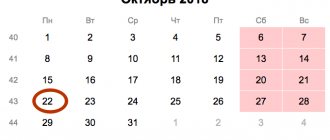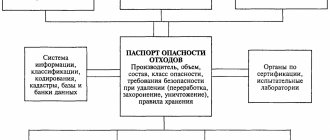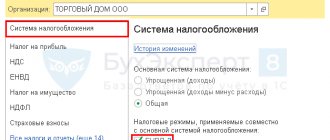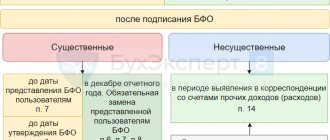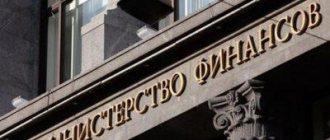Who can be recognized as an excise tax payer?
The list of persons who may be recognized as excise tax payers is given in paragraph 1 of Art. 179 of the Tax Code of the Russian Federation. These include:
- organizations;
- individual entrepreneurs;
- persons who move excisable goods across the customs border of our country, determined in accordance with customs legislation.
ConsultantPlus experts explained how to pay excise taxes to organizations. If you do not have access to the K+ system, get a trial online access for free.
Results
The object of excise taxation is transactions with excisable goods (for their transfer, sale, capitalization, etc.). Excise tax is calculated for each type of excisable goods, the tax base for which is determined in those units of measurement in which the excise tax rate is established.
“They want to impose excise taxes on alcohol for the production of cosmetics, household chemicals and medical products” will introduce you to the “excise” plans of the Ministry of Finance of the Russian Federation .
You can find more complete information on the topic in ConsultantPlus. Free trial access to the system for 2 days.
In what cases does the obligation to pay excise taxes arise?
Excise taxpayers have a permanent status only if they regularly carry out transactions subject to this tax. For others, such a duty may arise from time to time. The fact is that any of the above-mentioned entities must pay excise tax only when they carry out any of the transactions subject to excise taxes, i.e. operation with excisable goods. If such circumstances have not arisen, then the subject is not considered an excise tax payer. This is directly stated in paragraph 2 of Art. 179 of the Tax Code of the Russian Federation.
Procedure for calculation and payment
From the above it follows that the calculation of the direct tax burden on the corresponding transactions with excisable goods is carried out by tax subjects independently, based on the types of commercial products with which they work.
The type of product determines how the amount of tax payment is formed, that is, what type of rate will be applied, what its calculated value will be, and by what formula the tax is calculated.
Excise tax rates (or tariff rates), with a certain degree of convention, can be divided into:
- Firm amounts are fixed amounts in rubles that are imposed on each unit of the estimated tax base of taxable products;
- Combined bets are calculated bets that have both a fixed indicator and various changing odds inside the formula;
- Ad valorem – rates as a percentage, which are calculated based on the cost of excisable products of a certain type.
It is important! According to tax legislation (Tax Code, Article 193), the first two types of rates are in force in the Russian Federation, and the combined one also includes elements of ad valorem calculations, which are not used in their pure form in Russian practice.
Also, certain types of goods are subject to a number of tax breaks in the form of deductions (Articles 200 and 201) or exceptions under certain operating conditions (Articles 183–186.1).
The main excise rates for 2019–2021 can be found in the latest edition of the Tax Code of the Russian Federation. Below are some of them:
| Name of product | Excise tax rate (in % and (or) rubles per unit of calculation) | ||
| Until December 31, 2021 | Until December 31, 2021 | Until December 31, 2021 | |
| Wines and other drinks that do not have a geographical protected designation, for example: Champagne | 18 rub. for 1 l. | 19 rub. for 1 l. | 20 rub. for 1 l. |
| Beer and drinks made from it, containing from 0.5 to 8.6% alcohol. | 21 rub. for 1 l. | 22 rub. for 1 l. | 23 rub. for 1 l. |
| Cigarettes, cigarettes | 1890 rub. for 1000 pcs + 14.5% (of retail price). But not less than 2,568 rubles. per batch of 1000 pcs. | 1966 rub. for 1000 pcs + 14.5% (of retail price). But not less than 2671 rubles. for 1000 pcs. | 2045 rub. for 1,000 pcs. + 14.5% (of retail price). But not less than 2778 rubles. for 1000 pcs. |
| Vehicles with an engine over 112.5 kW (150 hp) and up to 147 kW (200 hp) power | 454 rub. by 0.75 kW (1 hp) | 472 rub. by 0.75 kW (1 hp) | 491 rub. by 0.75 kW (1 hp) |
| Class 5 gasoline | 12314 rub. for 1 t. | 12752 rub. for 1 t. | 13262 rub. for 1 t. |
How is excise duty calculated?
Already from the examples in the table you can see that the monetary equivalent is imposed on one or another unit of excisable products, that is, the tax base calculated in kilograms, liters, tons, 1000 pieces or kilowatts. This applies to fixed tariff rates, based, therefore, on the volume of goods sold in one way or another.
As an example, let's look at how accrual is carried out for the sale of a batch of beer and how much the brewery will pay as a result.
Let’s take it as a condition that the plant sold a batch of 200,000 bottles of beer with a volume of 0.5 liters per month.
To calculate the tax per unit, the following formula is used: N = NB x StAt, where N is tax, NB is the tax base (by volume in liters), StAt is the excise tax rate.
We look at the bet size in the table: it is 23 rubles for beer. for 1 l.
Since the rate is calculated per liter, we recalculate the number of bottles per liter to obtain the tax base: NB = 200,000 x 0.5 = 100,000 liters.
We enter the numbers into the formula: NB = 100000, StAt = 23.
H = 100,000 x 23 = 2,300,000 rubles.
We find that the brewery, as a direct taxpayer, will pay 2,300,000 rubles to the budget. excise tax.
The production and sale of beer and other alcoholic products bring considerable income to the state treasury
If an excisable product is subject to a combined rate, such as cigarettes or cigars, then the tax amount will include not only a fixed tariff according to the tax base, but also a state-determined interest rate, calculated from the retail price of one piece of product. In this case, with a certain convention, the formula can be presented as follows:
N = NB x StAt + MrP x P.
Data added to the formula: MRP – maximum retail selling price, P – percentage indicator established by the state.
What goods are excisable?
Excise goods are:
- ethyl alcohol, including denatured ethyl alcohol, raw alcohol, wine, grape, fruit, cognac, calvados, whiskey distillates;
- liquid alcohol-containing products with a volume fraction of ethanol of more than 9%, except for certain types:
- medicines;
- veterinary drugs;
- perfumery and cosmetic products;
- recycled alcohol production waste;
- wine materials;
- alcoholic products with a strength of more than 0.5%, with the exception of food products in accordance with the list established by the Government of the Russian Federation;
- beer with a standard (standardized) content of the volume fraction of ethyl alcohol up to 0.5% inclusive (clause 3.1, clause 1, article 181 of the Tax Code of the Russian Federation)
- tobacco products;
- passenger cars;
- powerful motorcycles (with an engine over 150 hp);
- petrol;
- diesel fuel;
- motor oils;
- straight-run gasoline;
- household heating oil produced from diesel fractions of direct distillation and (or) secondary origin, boiling in the temperature range from 280 to 360 degrees Celsius;
- benzene, paraxylene, orthoxylene;
- aviation kerosene;
- natural gas (in cases provided for by international treaties of the Russian Federation).
When should excise taxes be paid?
The end of each tax period means that it is time to calculate the amount of tax and contribute it to the budget. Art. 204 of the Tax Code of the Russian Federation establishes deadlines that must be met when making payments. At the same time, each category of excisable goods corresponds to certain deadlines: both for paying the tax into the budget and for submitting a tax return.
| When do you need to pay excise duty and file a tax return? | ||
| The period following the previous tax period | Object of taxation | Place of payment of excise taxes |
| Until the 25th of the next month | Products sold or transferred (goods) | In the territory where the product (goods) was produced |
| Until the 25th of the 3rd month | Operations carried out with ethyl alcohol (denatured) | In the territory where such goods are registered after purchase |
| Until the 25th of the 3rd month | Operations carried out with straight-run gasoline, benzene, orthoxylene, paraxylene, aviation kerosene and middle distillates | In the territory where the organization is located |
| Until the 25th of the 6th month | Operations carried out with middle distillates, carried out on the territory of the Russian Federation and abroad by companies that are included in the register of bunker fuel suppliers | In the territory where the organization and (or) its divisions are located |
Transactions giving rise to excise duty
The list of such operations is contained in Art. 182 of the Tax Code of the Russian Federation. Generally speaking, these include:
- any sale of excisable goods;
- transfer of produced excisable goods:
- the processor to the seller, as well as their receipt by the processor as payment for his services;
- within the organization for the further production of non-excisable goods (except for straight-run gasoline used for the further production of petrochemical products, or denatured ethyl alcohol for the production of non-alcohol-containing products if the organization has the necessary certificates to carry out operations with these substances);
- for your own needs;
- in the authorized capital, etc.;
- to a participant upon leaving the society;
- for processing on a toll basis.
- import of excisable goods into the country;
- receipt of certain types of excisable goods, including:
- denatured ethyl alcohol;
- straight-run gasoline;
- benzene, paraxylene or orthoxylene;
- aviation kerosene.
Attention! To carry out operations with certain goods, certificates for production, processing, etc., provided for in Art. 179.1–179.3 Tax Code of the Russian Federation.
What is not subject to excise taxes?
Provided that separate records are maintained, the following are not subject to excise taxes (Article 183 of the Tax Code of the Russian Federation):
- transfer within the organization of some excisable goods for the production of other excisable goods; the exception is provided in subpara. 22 clause 1 art. 182 of the Tax Code of the Russian Federation for ethyl alcohol;
- export of excisable goods, including if they are exported by the owner - the customer of processing or someone on his behalf, as well as the import of such goods into the port SEZ from the rest of our country;
- primary sale or transfer of confiscated, ownerless or rejected excisable goods for industrial processing under the control of customs or tax officials or for destruction;
- transfer within the organization:
- produced ethyl alcohol for the further production of alcohol-containing perfume and cosmetic aerosols, household chemicals;
- rectified ethyl alcohol produced from raw alcohol, to the division producing alcoholic beverages;
- produced alcoholic distillates (wine, grape, fruit, cognac, Calvados, whiskey) for aging or blending for the purpose of further production (bottling) of alcoholic products by the same organization;
- some operations with aviation kerosene and benzene, paraxylene and orthoxylene.
General information about excise taxes
Excise tax is an indirect tax that is added to the price of a product. Unlike direct taxes, the amount of excise tax does not depend on the income of an organization or individual entrepreneur. The tax is imposed on highly profitable products that are not included in the list of essential goods, as well as socially harmful goods.
The peculiarity of this tax is that on the way to the consumer, the goods sometimes go through a long chain of intermediaries, but in the end the excise tax is paid by the final consumer.
In Art. 181 of the Tax Code of the Russian Federation provides a complete list of goods considered excisable. For example, this list includes:
- alcohol-containing products and alcohol itself;
- alcoholic beverages of various types;
- tobacco and its derivatives;
- passenger cars;
- diesel fuel;
- gasoline, etc.
More complete information about which goods are included in the list of excisable goods can be obtained from the material “What is included in excisable goods - list 2015?”
Are individual entrepreneurs and special regime employees recognized as excise tax payers?
Tax Code of the Russian Federation in Art. 179 determines that excise tax payers are not only legal entities, but also individual entrepreneurs. The main condition here is the same for both categories of business entities - in order for them to be assigned this status, they must carry out the appropriate operations. The exception is resellers, but they will be discussed below in a separate chapter.
ConsultantPlus experts explained in detail how individual entrepreneurs pay excise taxes. Get free demo access to K+ and go to the Ready Solution to find out all the details of this procedure.
For special regimes, the situation requires a separate explanation: they may be excise tax payers, but they cannot always apply special regimes. Let us immediately note that we are talking here only about persons on the unified agricultural tax and the simplified tax system.
Let us now explain our conclusion in more detail.
Systems such as the Unified Agricultural Tax and the simplified tax system are unacceptable for those who are engaged in the production of excisable goods, including on a toll basis (subclause 2, clause 6, article 346.2, subclause 8, clause 3, article 346.12 of the Tax Code of the Russian Federation, letters from the Ministry of Finance of Russia dated March 18, 2011 No. 03-07-06/70).
Important! Production for the purposes of the “excise” chapter of the Tax Code of the Russian Federation means not only the release of excisable goods in themselves, but also:
- bottling of alcoholic beverages and beer, which is part of the overall production process;
- any mixing of goods in places of their storage and sale (except for public catering), which results in an excisable product subject to excise tax at a higher rate than the raw materials themselves.
When carrying out transactions not with produced, but with purchased goods, it is possible to apply simplified taxation and agricultural tax.
It should be borne in mind that these special regimes do not exempt persons using them from paying excise taxes. After all, in paragraph 3 of Art. 346.1 and paragraphs. 2–3 tbsp. 346.11 of the Tax Code of the Russian Federation, excise taxes are not listed among the taxes that are replaced by special ones.
This means that a simplifier or a payer of the Unified Agricultural Tax, when performing excisable transactions permissible for him, must fulfill all the duties of an excise payer.
What is the tax period for excise taxes?
In Art. 192 of the Tax Code of the Russian Federation determines that the tax period for excise taxes corresponds to a calendar month. Both organizations and individual entrepreneurs must pay excise taxes if they sell the relevant goods or products. In addition, payers of this type of tax are persons moving goods through the customs of the Eurasian Economic Union.
The tax period for taxable transactions is determined at the moment when excisable goods are sold (transferred). The date of such operation, in turn, is considered to be the day of shipment.
Having paid excise taxes, the taxpayer has the right to count on deductions specified by law. By their amount, the company can reduce the amount of tax intended for contribution to the budget.
For additional information about excise tax payers, see the material “Who are excise tax payers (nuances)?”
Who will be the excise tax payer if the goods are sold by an intermediary?
When selling excisable goods, excise tax payers are almost always manufacturers. The exception is the sale of confiscated, ownerless and abandoned valuables. Therefore, even when concluding an intermediary agreement, the manufacturer must pay excise tax. Moreover, the peculiarity of taxation here is that the excise tax must be charged at the time of transfer of excisable products to the intermediary, without waiting for the sale of goods to the final buyer. This is explained by the provisions of paragraph 2 of Art. 195 of the Tax Code of the Russian Federation, which defines the date of sale of excisable goods as the day of their shipment or transfer. Therefore, despite the retention of ownership of excisable goods by the manufacturer, the tax must be calculated immediately upon transferring them to the intermediary. This is what the Russian Ministry of Finance thinks (see letter dated October 1, 2008 No. 03-07-06/87).
